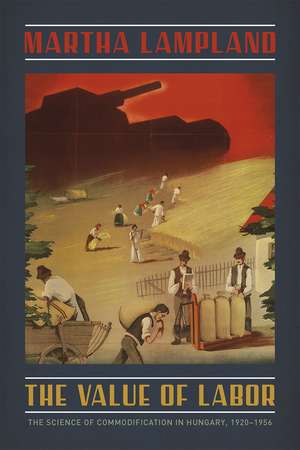The Value of Labor: The Science of Commodification in Hungary, 1920-1956: Emersion: Emergent Village resources for communities of faith
Autor Martha Lamplanden Limba Engleză Paperback – 13 oct 2016
At the heart of today’s fierce political anger over income inequality is a feature of capitalism that Karl Marx famously obsessed over: the commodification of labor. Most of us think wage-labor economics is at odds with socialist thinking, but as Martha Lampland explains in this fascinating look at twentieth-century Hungary, there have been moments when such economics actually flourished under socialist regimes. Exploring the region’s transition from a capitalist to a socialist system—and the economic science and practices that endured it—she sheds new light on the two most polarized ideologies of modern history.
Lampland trains her eye on the scientific claims of modern economic modeling, using Hungary’s unique vantage point to show how theories, policies, and techniques for commodifying agrarian labor that were born in the capitalist era were adopted by the socialist regime as a scientifically designed wage system on cooperative farms. Paying attention to the specific historical circumstances of Hungary, she explores the ways economists and the abstract notions they traffic in can both shape and be shaped by local conditions, and she compellingly shows how labor can be commodified in the absence of a labor market. The result is a unique account of economic thought that unveils hidden but necessary continuities running through the turbulent twentieth century.
Lampland trains her eye on the scientific claims of modern economic modeling, using Hungary’s unique vantage point to show how theories, policies, and techniques for commodifying agrarian labor that were born in the capitalist era were adopted by the socialist regime as a scientifically designed wage system on cooperative farms. Paying attention to the specific historical circumstances of Hungary, she explores the ways economists and the abstract notions they traffic in can both shape and be shaped by local conditions, and she compellingly shows how labor can be commodified in the absence of a labor market. The result is a unique account of economic thought that unveils hidden but necessary continuities running through the turbulent twentieth century.
Din seria Emersion: Emergent Village resources for communities of faith
-
 Preț: 160.63 lei
Preț: 160.63 lei -
 Preț: 229.92 lei
Preț: 229.92 lei -
 Preț: 133.99 lei
Preț: 133.99 lei -
 Preț: 182.98 lei
Preț: 182.98 lei - 18%
 Preț: 348.59 lei
Preț: 348.59 lei - 9%
 Preț: 352.77 lei
Preț: 352.77 lei - 12%
 Preț: 290.56 lei
Preț: 290.56 lei -
 Preț: 307.53 lei
Preț: 307.53 lei - 8%
 Preț: 360.28 lei
Preț: 360.28 lei -
 Preț: 208.31 lei
Preț: 208.31 lei -
 Preț: 279.55 lei
Preț: 279.55 lei -
 Preț: 302.76 lei
Preț: 302.76 lei - 18%
 Preț: 2261.34 lei
Preț: 2261.34 lei -
 Preț: 115.82 lei
Preț: 115.82 lei -
 Preț: 156.84 lei
Preț: 156.84 lei -
 Preț: 115.53 lei
Preț: 115.53 lei -
 Preț: 161.27 lei
Preț: 161.27 lei - 8%
 Preț: 311.68 lei
Preț: 311.68 lei -
 Preț: 167.85 lei
Preț: 167.85 lei - 8%
 Preț: 346.31 lei
Preț: 346.31 lei - 6%
 Preț: 324.95 lei
Preț: 324.95 lei -
 Preț: 176.49 lei
Preț: 176.49 lei - 9%
 Preț: 353.24 lei
Preț: 353.24 lei -
 Preț: 101.43 lei
Preț: 101.43 lei -
 Preț: 144.80 lei
Preț: 144.80 lei - 8%
 Preț: 563.24 lei
Preț: 563.24 lei - 8%
 Preț: 564.99 lei
Preț: 564.99 lei -
 Preț: 215.51 lei
Preț: 215.51 lei -
 Preț: 146.50 lei
Preț: 146.50 lei -
 Preț: 216.08 lei
Preț: 216.08 lei -
 Preț: 176.35 lei
Preț: 176.35 lei -
 Preț: 273.93 lei
Preț: 273.93 lei -
 Preț: 144.99 lei
Preț: 144.99 lei -
 Preț: 128.69 lei
Preț: 128.69 lei -
 Preț: 183.89 lei
Preț: 183.89 lei -
 Preț: 106.35 lei
Preț: 106.35 lei -
 Preț: 548.71 lei
Preț: 548.71 lei -
 Preț: 179.04 lei
Preț: 179.04 lei - 9%
 Preț: 352.50 lei
Preț: 352.50 lei -
 Preț: 138.81 lei
Preț: 138.81 lei -
 Preț: 147.26 lei
Preț: 147.26 lei -
 Preț: 67.35 lei
Preț: 67.35 lei -
 Preț: 127.89 lei
Preț: 127.89 lei -
 Preț: 209.88 lei
Preț: 209.88 lei - 18%
 Preț: 502.35 lei
Preț: 502.35 lei -
 Preț: 138.26 lei
Preț: 138.26 lei -
 Preț: 94.22 lei
Preț: 94.22 lei -
 Preț: 126.25 lei
Preț: 126.25 lei -
 Preț: 92.35 lei
Preț: 92.35 lei -
 Preț: 163.52 lei
Preț: 163.52 lei
Preț: 342.73 lei
Nou
Puncte Express: 514
Preț estimativ în valută:
65.59€ • 67.76$ • 54.59£
65.59€ • 67.76$ • 54.59£
Carte tipărită la comandă
Livrare economică 25 martie-08 aprilie
Preluare comenzi: 021 569.72.76
Specificații
ISBN-13: 9780226314600
ISBN-10: 022631460X
Pagini: 368
Ilustrații: 11 halftones, 5 tables
Dimensiuni: 152 x 229 x 23 mm
Greutate: 0.48 kg
Ediția:1
Editura: University of Chicago Press
Colecția University of Chicago Press
Seria Emersion: Emergent Village resources for communities of faith
ISBN-10: 022631460X
Pagini: 368
Ilustrații: 11 halftones, 5 tables
Dimensiuni: 152 x 229 x 23 mm
Greutate: 0.48 kg
Ediția:1
Editura: University of Chicago Press
Colecția University of Chicago Press
Seria Emersion: Emergent Village resources for communities of faith
Notă biografică
Martha Lampland is professor of sociology and faculty director of the Science Studies Program at the University of California, San Diego. She is the author or editor of several books, including Standards and their Stories and The Object of Labor, the latter published by the University of Chicago Press.
Cuprins
Note on the Text
List of Abbreviations
Glossary
List of Illustrations
Acknowledgements
Introduction
Part 1
1 Moral Imperatives, Political Objectives
2 Rationalizing the Economic Infrastructure
3 Formalizing Practices
4 The Problem with Money
Part 2
5 State Matters
6 A New Matrix of Labor Value
7 Administering Coercion
8 Fighting over Numbers
Conclusion
List of Archives
Notes
Bibliography
Index
List of Abbreviations
Glossary
List of Illustrations
Acknowledgements
Introduction
Part 1
1 Moral Imperatives, Political Objectives
2 Rationalizing the Economic Infrastructure
3 Formalizing Practices
4 The Problem with Money
Part 2
5 State Matters
6 A New Matrix of Labor Value
7 Administering Coercion
8 Fighting over Numbers
Conclusion
List of Archives
Notes
Bibliography
Index
Recenzii
"Following on the path of questioning that Lampland laid out in The Object of Labor (1995), The Value of Labor delves deeper into the technopolitical history of the commodification of agrarian labour in Hungary. . . . In The Value of Labor, she follows the expert and policy debates in 1930s work science, and points out their continuities with the institutionalization of the work unit in the Stalinist phase of collectivization, contradicting the Cold War concept of Stalinist modernization as Soviet models imposed from scratch."
"Consequently, the book opens up comparative work not only across time (Lampland outlines striking parallels between agricultural transition in the early 1990s, when she started reading materials for this book, and the Stalinist agricultural transition she was reading about), but also geographically and across production systems."
"This book’s outstanding insights spring from the author’s knowledge and skillful use of an enormous variety of published and unpublished sources, including local newspapers and archival collections. As her previous works have already proved, she is one of the leading experts on modern Hungarian history."











